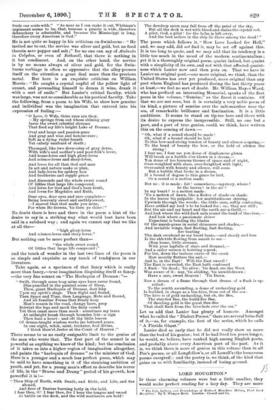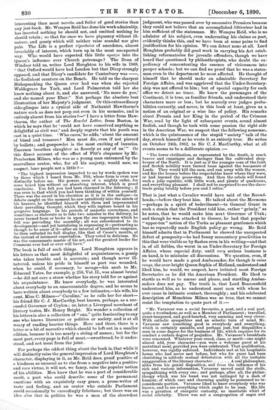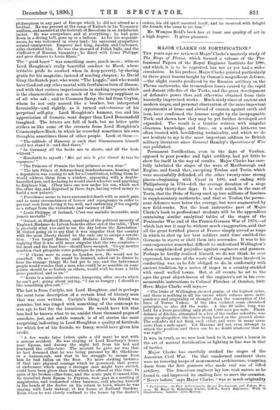LORD HOUGHTON.* IF these charming volumes were but a little
smaller, they would make perfect reading for a lazy day. They are more
• The Life, Letters, and Friendships of Richard Monaton Manes, Ftret Lord Houghton. By T. Weinyas Reid. London : Caswell and Co.
interesting than most novels, and fuller of good stories than any jest-book. Mr. Wemyss Reid has done his work admirably, has inserted nothing he should not, and omitted nothing he should retain ; so that for once we have piquancy without ill- nature, and gossip which will neither raise scandal nor give pain. The Life is a perfect repertoire of anecdotes, almost invariably of interest, which turn np in the most unexpected way. Who would have expected this little aper9u into the Queen's influence over Church patronage ? The Dean of Windsor told us, writes Lord Houghton to his wife in 1868, " that Oxford would have had London but that Dizzy strongly opposed, and that Dizzy's candidate for Canterbury was —, the foolishest creature on the Bench. He told us the sharpest Bishopmaking the Queen ever had was when she rejected Waldegrave for York, and Lord Palmerston told her she knew nothing about it, and she answered, No more do you,' and she named your Ebor." Not perhaps the absolute best illustration of her Majesty's judgment. Or this extraordinary side-glimpse into a cynical side of Nathaniel Hawthorne's nature such as does not peep out even in his memoirs, and is entirely absent from his stories ?—" I have a letter from Haw- thorne, the author of The Scarlet Letter, from Boston, in which he says that he could not have conceived anything so delightful as civil war,' and deeply regrets that his youth was cast in a quiet time. Who cares,' he adds, about the amount of blood and treasure ? Men must die, even if not pierced by bullets ; and gunpowder is the most exciting of luxuries. Emerson breathes slaughter as fiercely as any of us." Or this direct account of the effect of Pitt's eloquence by Mr. Pemberton Mikes, who was as a young man entranced by the
marvellous orator, who, for all his majesty, would now, we suspect, bore people not a little?— "The highest impression imparted to me by words spoken was by those which I heard from Mr. Pitt, whose form is even now distinctly before me. His powers were of a mighty order, for none heard him without an absorbing interest, which is proof conclusive. You felt you had been charmed in the listening ; it was even to that which you had been thinking of within yourself. There was the secret in his elocution as it is in the antique—in debate caught on the moment he saw intuitively into the minds of his hearers, he identified himself with them and impersonated their prevailing thought, which they with rapture heard in his gorgeous language. In his periods of majestic correctness, and sometimes so elaborate as to take two minutes in the delivery, he never turned from or broke in upon the one impression which he felt was pervading the assembly ; all was subordinated to its development—and yet tantalising in expressing it—protracting as though to be surer of it—after an interval of breathless suspense, he then unfurled its full display, like that of Caesar's mantle, at the instant of intensest expectation. They voted in delirium. He was the consummate master of his art, and the greatest leader the Commons ever had or ever will have."
The book is full of such things. Lord Houghton appears in his letters as that most delightful of acquaintances, a gossip
who takes trouble and is accurate ; and though never ill- natured, unless his pride in himself as poet was wounded, when he could, if necessary, be savage—his snub to Mr. Edmund Yates, for example, p. 258, Vol. II., was almost brutal —he did not care a straw whether his story told for or against his acquaintance. He knew everybody, he was interested about everybody to an unaccountable degree, and he seems to have written about everybody to a few intimates,—his wife, his aunt, Miss C. Milnes—" Caroline," as he calls her for short— his friend Sir C. J. MacCarthy, best known, perhaps, as a suc- cessful Governor of Ceylon ; or, later, a Liverpool merchant of literary tastes, Mr. Henry Bright. No wonder a collection of his letters is also a collection of " ana," quite fascinating to any one who knows literature or politics or society, and is at all weary of reading heavier things. Here and there, there is a letter or a bit of narrative which should be left out in a smaller edition, because it is too nearly a string of names ; but for the most part, every page is full of meat,—sweetbread, be it under- stood, and not meat from the joint.
For perhaps the oddest thing about the book is, that while it will distinctly raise the general impression of Lord Houghton's character, displaying in it, as Mr. Reid does, proof positive of a kindness so unusual as to rise from a negative into a positive and rare virtue, it will not, we fancy, raise the popular notion of his abilities. Men knew that he was a poet of considerable merit, a poet who could describe some of the permanent emotions with an exquisitely easy grace, a prose-writer of taste and feeling, and an orator who outside Parliament could occasionally be exceedingly felicitous; but there was an idea also that in politics he was a man of the shrewdest
judgment, who was passed over by successive Premiers because they could not believe that an accomplished litterateur had in him sufficient of the statesman. Mr. Wemyss Reid, who is no
adulator of his subject, even underrating his claims as poet, evidently thinks this, and we have been at some pains to find justification for his opinion. We can detect none at all. Lord Houghton probably did good work in carrying his Act estab- lishing reformatories for juvenile offenders, though we have heard that questioned by philanthropists, who doubt the ex-' pediency of concentrating the essence of viciousness into pauper schools ; but we can find no proof that he was a states- man even in the department he moat affected. He thought of himself that he should make an admirable Secretary for Foreign Affairs, and was aggrieved that the Under-Secretary- ship was not offered to him; but of special capacity for such
office we detect no trace. He knew the personages of the Continent, it is true, as familiar friends, and understood their
characters more or less; but he scarcely ever judges proba- bilities correctly, and never, in this book at least, gives us a notion of an original or a wise line of policy. His remarks about Prussia and her King in the period of the Crimean War, read by the light of subsequent events, sound almost foolish, and though he took with some passion the right side in the American War, we suspect that the following nonsense, which is the quintessence of the stupid " society" talk of the day, struck himself as he wrote it as entirely true. He writes on October 24th, 1862, to Sir C. J. MacCarthy, what at all events seems to be a deliberate opinion
The lower civilisation, as represented by the South, is much braver and cunninger and daringer than the cultivated shop- keeper of the North. It is just as if the younger sons of the Irish and Scotch nobility were turned loose against the bourgeoisie of Leeds. They would kill the men, and run away with the women, and fire the houses before the respectables knew where they were, or had learned the goose-step. And then the rebels will found such a jolly republic, with little work, and plenty of quadroons, and everything pleasant. I shall not be surprised to see the slave- trade going briskly before you and I retire."
That is just what a Cavalier would have said of the Round- heads,—before they beat him. He talked about the Mormons
—perhaps in a spirit of bedevilment—to General Grant in such a strain that the President told him, rather " grimly," as he notes, that he would make him next Governor of Utah; and though he was attached to Greece, he had that popular " upper-ten " notion of the Turks as pleasant gentlemen which has so repeatedly made English policy go wrong. Mr. Reid himself admits that in Parliament he showed the unexpected defect of pomposity—he had funny momentary proclivities to this that were visible as by flashes even in his writing—and that
is, of all foibles, the worst in an Under-Secretary for Foreign Affairs, whose especial duty, until very serious business is on hand, is to minimise all discussions. We question, even, if he would have made a good Ambassador, for though la rein rouge, the over-bright Queen Sophia of Holland, understood and
liked him, he would, we suspect, have irritated most Foreign Secretaries as he did the American President. He liked to startle as well as to amuse and please, and startling Ambas- sadors does not pay. The truth is, that Lord Beaconsfield understood him, as he understood most men with whom he ever came in intimate contact, thoroughly; and his celebrated description of Monckton Mikes was so true, that we cannot resist the temptation to quote part of it
Mr. Vavasour was a social favourite, a poet, and a real poet, quite a troubadour, as well as a Member of Parliament ; travelled, sweet-tempered, and good-hearted, very amusing and very clever. With catholic sympathies and an eclectic turn of mind, Mr. Vavasour saw something good in everybody and everything, which is certainly amiable, and perhaps just, but disqualifies a man in some degree for the business of life, which requires for its conduct a certain degree of prejudice. Mr. Vavasour's breakfasts were renowned. Whatever your creed, class, or merit—one might almost add, your character—you were a welcome guest at his matutinal meal, provided you were celebrated. That qualification, however, was rigidly enforced. Individuals met at his hospitable house who had never met before, but who for years had been cherishing in solitude mutual detestation with all the irritable
exaggeration of the literary character A real philosopher, alike from his genial disposition, and from the influence of his rich and various information, Vavasour moved amid the strife, sympathising with every one ; and peithaps, after all, the philan thropy which was his boast was not untinged by a dash of humour, of which rare and charming quality he possessed no in- considerate portion. Vavasour liked to know everybody who was known, and to see everything which ought to be seen. His life was a gyration of energetic curiosity, an insatiable whirl of social celebrity. There was not a congregation of sages and
philosophers in any part of Europe which he did not attend as a brother. He was present at the camp of Kalisch in his Yeomanry uniform, and assisted at the festivals of Barcelona in an Andalusian jacket. He was everywhere and at everything ; he had gone down in a diving bell, gone up in a balloon. As for his acquaint- ances, he was welcomed in every land ; his universal sympathies seemed omnipotent. Emperor and king, Jacobin and Carbonari, alike cherished him. He was the steward of Polish balls, and the vindicator of Russian humanity ; he dined with Louis Philippe and gave dinners to Louis Blanc."
The " good heart " was something more, much more ; witness Lord Houghton's really beautiful conduct to Hood, whose irritable pride he soothed when in deep poverty, by slaving gratis for his magazine, instead of sending cheques ; to David Gray, the Scotch poet, who wrote "The Luggie," and who would have tired out any other mortal with fretfulness born of disease, and with that curious imperiousness in making requests which is the characteristic not so much of the literary suppliant as of all who ask ; and to Coomara Samy, the lad from Ceylon, whom he not only nursed like a brother, but interpreted favourably—and rightly, as it turned out—because of his perpetual self-pity. Lord Houghton's humour, too, and his appreciation of humour, went deeper than Lord Beaconsfield imagined. The letters are full of both, but no letter quite strikes us like some of the extracts from Lord Houghton's Commonplace-Book, in which he recorded sometimes his own thoughts, sometimes those of other people. Look at these :— " The solitude of Hanover is such that Zimmermann himself could not stand it—and died there."
" In Germany all the books are in sheets, and all the beds without."
"Humboldt to myself : Moi qui suis le pere eternel de t014.4 les 'voyageurs.'" "The Princess of Prussia the best princess on any stage."
" The late Prince of Schwarzburg Sondershausen, hearing that a deputation was coming to ask for a Constitution, telling them he would address them from a window, appearing with a double- barrelled gun, and declaring he would shoot whoever said anything to displease him. (They have one now under his son, which met the other day, and dispersed in three days, having voted money to build a new palace)."
" Providence seems to have surrounded death with so much pain and so many circumstances of horror and repugnance in order to prevent men from loving it too well, and embracing it too eagerly as a refuge from the vicissitude and vacancy of life."
"Louis Philippe of Ireland, C'est une maladie incurable, mais jamais mortelle.'
"Guizot, at Stafford House, speaking of the political security of England, Madame de Lieven from the other end of the table, 'That is precisely what you said to me the day before the Revolution.' M. Guizot going on to say that it was singular that the country with the most liberty should be the only one to escape a revolu- tion. You forget Russia,' said Madame Lieven. M. Guizot replying that it was still more singular that the two countries— the most and the least free—should have escaped. Ce qui montre combien etait pitoyable votre politique du juste milieu."
" If Christ were to come to London now, He would not be crucified. Oh no He would be lionised, asked out to dinner to hear the strange things He had got to say, and the bettermost people would wonder that a man who could be so sensible on some points should be so foolish on others, would wish he were a little more practical, and so on. "
" Keats is a miserable creature, hungering after sweets which he can't get ; going about saying, "I am so hungry; I should so like something pleasant." ' "
The last is from Carlyle, not Lord Houghton, and is perhaps the most terse description of a certain kind of literary man that was ever written. Carlyle's liking for his friend was genuine, but was tinged with something of the contempt he was apt to feel for the luxurious. He would have felt that less had he known what to us, amidst these thousand pages of anecdote, jest, and subtle remark, is of all stories the most surprising, indicating in Lord Houghton a quality of fortitude for which few of his friends, we fancy, would have given him credit.
" A few weeks later (when quite a old man) he met with a serious accident. He was staying at Lord Rosebery's house near Epsom, and during the night fell from his bed and fractured the collar-bone. The account he gave me was that he had dreamed that he was being pursued by Mr. Gladstone in a hansom-cab, and that in his struggle to escape from him he had fallen on the floor. No more striking instance of that rare physical courage which he possessed, that power of endurance which many a stronger man might have envied. could have been given than that which he offered at this time. In spite of his broken collar-bone, and the acute pain it caused him, he travelled from Epsom to Fryston, took part in a meeting of magistrates, and transacted other business, only placing himself in the hands of the doctor on his return to town, where he was
staying with Lady Galway, at her house at Rutland Gardens. Even when he was closely confined to the house by the doctor's
orders, his old spirit asserted itself, and he received with delight the friends who came to see him."
Mr. Wemyss Reid's book has at least one quality of art in a high degree. It gives pleasure.
























































 Previous page
Previous page